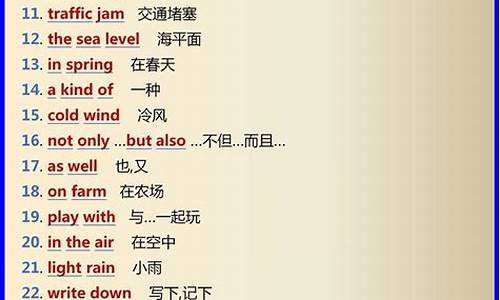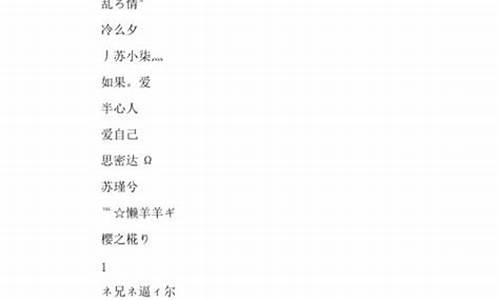七下英语短语句子大全_七下英语短语句子大全带翻译
1.回答得好加分 七下英语所有重点句型
2.新目标英语七年级下册每个单元的标题句子
3.求七年级下册英语句子
4.七年级下册英语第三单元重点短语及句型
5.人教版七年级下册英语unit1~unit4单词短语句子语法总结
6.七年级下册英语句子翻译
7.七年级下英语三单元短语

Unit 3 Why do you like koalas?
一.重点词组
eat grass eat lees be quiet very shy very smart very cute
play with her friends kind of South Africa other animals
at night in the day every day during the day
二. 交际用语
Why do you like pandas? Because they’re very clever.
Why does he like koalas? Because they’re kind of interesting.
Where are lions from? They are from South Africa.
What other animals do you like? I like dogs, too. Why? Because they’re friendly and clever.
Molly likes to play with her friends and eat grass.
She’s very shy. 7. He is from Australia.
8.He sleeps during the day, but at night he gets up and eats lees.
9.He usually sleeps and relaxes 20 hours every day.
10.Let’s see the pandas first. 11.They’re kind of interesting.
12.What other animals do you like? 13.Why do you want to see the lions?
三. 重点难点释义
1、kind of 有点,稍微 Koala bears are kind of shy. 考拉有点害羞。
kind 还有“种类”的意思
如:各种各样的 all kinds of We he all kinds of beautiful flowers in our school.
2、China n. 中国 Africa n. 非洲
China 和Africa都是专有名词,首字母都应该大写,而且和介词in连用。
There are many kinds of tigers in China. There are many kinds of scary animals in Africa.
3、friendly adj. 友好的,和蔼可亲的
它是名词friend的形容词形式,常常和be动词连用, be friendly。
The people in Chengdu are very friendly.
4、with prep. 跟,同,和…在一起
I usually play chess with my father.
注意区别与and的用法,and通常用于连接主语或宾语,连接主语时,
如果有I, I通常放在 and 之后,如:
My father and I usually play chess together.
Play with “和…一起玩耍”“玩…”
I often play with my pet dog. Don’t play with water!
5、day和night 是一对反义词,day 表示白天或一天,night表示夜或夜晚。
通常说in the day, during the day, at night。
Koala bears often sleep during the day and eat lees at night.
6、leaf n. 叶子
复数形式为:lees, 类似的变化还有:wife—wives, wolf—wolves,
knife—knives,scarf---scarfs(scarves)等。
7、hour n. 小时;点钟 hour前边通常加上冠词an 表示“一个小时”, 即:an hour。
There are 24 hours in a day and 60minutes in an hour.
8、be from 来自… be from = come from
Pandas are from China. = Pandas come form China.
9、meat n. (食用的)肉,为不可数名词,表示“许多”时,使用much来修饰,即:much meat He eats much meat every day.
10、grass n. 草, 为不可数名词,表示“许多”时,使用much来修饰,即:much grass。
There is much grass on the playground.
四. 语法知识
特殊疑问句通常以“what”、“who”、“which”、“when”、“where”、“how”、“how old”、“how many”等开头,对某一具体问题进行提问。 特殊疑问句的基本构成有两种情况: 1. 疑问句+一般疑问句结构。这是最常见的情况。例如: What’s your grandfather’s telephone number?你爷爷的电话号码是多少? Who is that boy with big eyes?那个大眼睛的男孩是谁? Which season do you like best? 你最喜欢哪个季节? When is he going to play the piano?他什么时候弹钢琴? Where does he live?他住在哪儿? How are you? 你好吗? How old are you?你多大了? How many brothers and sisters do you he? 你有几个兄弟姐妹?2. 疑问句+陈述句结构。这时疑问词作主语或修饰主语。例如: Who is on duty today? 今天谁值日? Which man is your teacher? 哪位男士是你的老师? 我们学过的What/How about+名词/代词+其他?也是特殊疑问句,它是一种省略结构。
例如:
I like English. What/How about you? 我喜欢英语。你呢?
What about playing basketball? 打篮球怎么样?
祝你学习进步,更上一层楼!请记得纳,谢谢!(*^__^*)
回答得好加分 七下英语所有重点句型
有书好好读,有书赶快读,读书的时间不多。只要我们刻苦拼搏、一心向上,就一定能取得令人满意的成绩。下面是我为您整理的《人教版七年级下册英语知识点 总结 》,仅供大家参考。
初一英语下册语法知识点
1、can+动词原形,它不随主语和数而变化。
(1)含有can的肯定句:主语+can+谓语动词的原形+其他。
(2)变一般疑问句时,把can提前:Can+主语+动词原形+其他?
肯定回答:Yes,主语+can。否定回答:No,主语+can't.
(3)含有can的否定句:主语+can't+动词的原形+其他。
(4)含有can的特殊疑问句:特殊疑问词+can+主语+动词原形+其他?
2、may+动词的原形。(may为情态动词)一般疑问句是把may提前,
肯定回答是:Yes,主语 +may。否定回答是:No,主语+mustn't。或please don't。
join+某个组织,俱乐部,party,参军,党派等 “加入”
Join sb. “参加到某人中” join in (doing)sth “加入做......,参加某个活动” Join in=take part in +活动,比赛
3、说某种语言:speak+语言 4、play+球、棋、牌;play+the+乐器。
5、擅长于(做)什么:be good at +名词/动ing
6、帮助某人做某事:help sb. (to ) do sth. help sb. with sth.
7、我能知道你名字吗?May I know your name?
8、想要做什么:want to do sth 例如:I want to learn about art.
9、What club do you want to join?
I want to join the chess club and the basketball club.
10、What club does Tom want to join? He wants to join the swimming club .
11、He can’t play the violin or the piano. Can you help kids with swimming?
12、Why do you want to join the English club? Because I want to learn English well.
初一英语下册语法知识点
1、what time和when引导的特殊疑问句。
(1)对时间提问用what time,也可以用when。询问钟点时用what time,询问日期、月份、年份时用when。
(2)询问做某事的时间时,两者可以互换。 (3)其他询问时间的 句子 :
What's the time? =What time is it?现在几点了?
时刻表达法:顺读法和逆读法。
(1)顺读法:“钟点+分钟”直接读数字。
(2)逆读法:借助介词past或to表示,要先说分再说钟点。
A.当分钟不超过30分钟时(包括30分钟),即<或=30,用past表示。其结构为:“分钟+past+整点” 意为“几点过几分”。
B.当超过30分钟时,即>30,用to表示。其结构为:“所差分钟(即60—所
过分钟数)+to+下一个整点”,to译成“差”,差几分钟到几点。
C.当分钟为30分钟用half表示,当分钟为15分钟用a quarter。
2、always 总是>usually 通常>often常常>sometime 有时
3、Watch+TV、球赛 “观看,观赏”,特指长时间注视。
See+**、医生 “看见”,强调看的结果。
Look “看”,强调看的动作,look后接宾语时要用介词at。
Read+书刊、杂志 “阅读”
4、listen to +宾语 6、Take a shower “淋浴” 7、Eat breakfast 吃早餐
5、Go to +地点名词 如:go to school go+地点副词 如:go home
初一英语下册语法知识点
一、本单元知识点总结
1.get to school 到校 2.take the subway 乘地铁
3.take the train 坐火车 4.lee for 到……地方去,离开去某地
5.take…to…把……带到…… 6. most students 大多数学生
7. from…to…从……到…… 8.think of 想到,想起
9.ride bikes 骑自行车 10.in other parts of the world 在世界的其他地方
11. how far 多远 (路程、距离) 12.how long多长(时间)
13.take the train to school 乘火车去上学 14.in places 在一些地方
15.go to school by boat乘船去上学 16.on the school bus乘坐校车
17.be different from和……不同 18.one 11-year old boy 一个十一岁大的男孩
二、重点知识详解
1.take +a/an/the+表示交通工具的名词,乘……去某地,是动词 短语 ,在句中作谓语。
He takes the train. take the subway乘地铁 take a walk散步 take a shower洗个澡
take a rest休息一会 take a seat 坐下 take some medicine 吃药
2.by+表示交通工具的单数名词或on/in+ a/an/the/one’s+表示交通工具的单数名词,是介词短语作方式状语。
I get to school by bike. = I get to school on my bike.
3.walk/ride/drive/fly+to+地点名词,步行/骑自行车/开车/坐飞机去某地
表示乘交通工具方式可以互换表达相同的意义:
Take the bus to school=go to school by bus=go to school on a bus
Drive a car to work=go to work by car=go to work in a car
Fly to shanghai=go to shanghai by plane/air=take the/a plane to shanghai=go to shanghai on a/an/the plane.
4.get表示“到达”,后接名词需加to,接地点副词不加to.
reach 给示到达,是及物动词,其后直接接宾语。
arrive in+大地点 arrive at +小地点 后接副词不需介词。
5. It takes sb some money/time to do sth.花费某人多少时间/钱做某事
Sb pay some money for sth 某人为某物花费多少钱
Sb spend some time/money on sth 某人在做某事或某物上花费时间/钱Sb spend some time/ money (in)doing sth Sth cost sb some money 某物花费某人多少钱
6. How far is it from A to B?=How far is B from A?
答语有两种:W wW.x kB 1.c Om
(1) It’s…meters/miles/kilometers(away)有……米/英里/千米(远)
(2) It ‘s about ten minutes’ walk/ ride. 大约有十分钟步行/骑车的路程。
7he to 后加动词原形,侧重客观的需要,有“不得不,被迫”之意,有多种时态形式,否定式为don’t he to(needn’t)意为“不必”。
Must 侧重于说话者的主观看法,认为有必要或有义务做某事,只有现在时一种形式,否定式must’t意为“一定不要,不允许,禁止”反意词为“needn’t”。
8.感谢用语:Thank you very much , Thanks a lot , Many thanks.
回答感谢用语的句子:That’s ok /all right. 不用谢。You are welcome 不客气。 It is my pleasure./My pleasure./It is a pleasure.不客气、那是我的荣幸。/Don’t mention it。别在意。 It was nothing at all.那没什么。
三、语法归纳
(一)how 引导的特殊疑问句
1.how 引导的特殊疑问句提问交通方式,其答语分三种情况:
a. take a/an/the+交通工具(单数)
b. by+交通工具(单数)
c. on/in+限定词+交通工具
2. how far 用来提问距离,多远,其答语分为两种:
(1)用长度单位表示:It is five kilometers.
(2)用时间表示:It’s twenty minutes’ walk.
3.how long 用来提问时间,意为多久回答常用“for+段时”。
----How long he you learnt English?
----For 3 years.
how soon 用来提问做完某事还需要多长时间, 常用于将来时态时, 常用“in+时间段”来回答。
――How soon will you arrive in Beijing?
----In 3 hours.
初一英语下册语法知识点相关 文章 :
★ 初一英语全册语法知识点汇总
★ 七年级英语下册语法重点知识点总结
★ 七年级英语语法知识点整理
★ 人教版英语七年级下册语法知识点
★ 七年级英语下册语法总结
★ 初一下册英语知识点归纳
★ 初一下册英语知识点汇总
★ 初一英语语法知识点大全
★ 初一英语下册语法
★ 初一下册英语必背知识点汇总
新目标英语七年级下册每个单元的标题句子
新目标七下期末重点短语句型复习
新目标七下期末重点短语句型复习
Unit 1 Where’s your pen pal from?
一.短语:
1 .be from = come from 来自于----
2. live in 居住在---
3. on weekends 在周末
4 .write to sb = write a letter to sb 给某人写信;写信给某人
5 .in the world 在世界上 in China 在中国
6.pen pal 笔友 14 years old 14岁 forite subject 最喜欢的科目
7.the United States 美国 the United Kingdom 英国
New York 纽约
8.speak English 讲英语 like and dislike 爱憎
9.go to the movies 去看** play sports 做运动
二.重点句式:
1 Where’s your pen pal from? = Where does your pen pal from/
2 Where does he live?
3 What language(s) does he speak?
4 I want a pen pal in China.
5 I can speak English and a little French.
6 Please write and tell me about yourself.
7 Can you write to me soon?
8 I like going to the movies with my friends and playing sports.
三.本单元的国家,人民、语言对应。
1 Canada---- Canadian---- English / French
2 France------ French------French
3 Japan------Japanese----Japanese
4 Australia----Australian----- English
5 the United States------ American---- English
6 the United Kingdom---British----- Enghish
Unit 2 Where’s the post office?
一. Asking ways: (问路)
1. Where is (the nearest) ……? (最近的)……在哪里?
2. Can you tell me the way to ……? 你能告诉我去……的路吗?
3. How can I get to ……? 我怎样到达……呢?
4. Is there …… near here / in the neighborhood? 附近有……吗?
5. Which is the way to ……? 哪条是去……的路?
二.Showing the ways: (指路)
1. Go straight down / along this street. 沿着这条街一直走。
2. Turn left at the second turning. 在第二个路口向左转。
3. You will find it on your right. 你会在你右手边发现它。
4. It is about one hundred metres from here. 离这里大约一百米远。
5. You’d better take a bus. 你最好坐公交车去。(You’d better+动词原形)
三.词组
1. across from …… 在……的对面 across from the bank 在银行的对面
2. next to…… 紧挨着…… next to the supermarket 紧挨着超市
3. between……and…… 在……和……之间
between the park and the zoo 在公园和动物园之间
among 表示位于三者或三者以上之间
4. in front of…在……前面 There is a tree in front of the classroom. 课室前面有棵树。
in the front of…在……(内)的前部 There is a desk in the front of the classroom.课室内的前部有张桌子。
5. behind…… 在……后面 behind my house 在我家后面
6. turn left/ right 向左/右拐 on the left/right of…在某物的左/右边 on the left of our school 在我们学校的左边
on one’s left/right 在某人的左/右边 on my left在我左边
7. go straight 一直走
8. down /along…沿着……(街道) down/along Center Street 沿着中央街
9. in the neighborhood=near here=around here=nearby在附近
10 welcome to…… 欢迎来到……
11. take /he a walk 散步
12. the beginning of……的开始,前端 at the beginning of…在……的开始,前端in the beginning 起初,一开始
13. he fun=he a good time=enjoy oneself 玩得开心,过得愉快
我昨天玩得很开心。 I had fun yesterday.
I had a good time yesterday.
I enjoyed myself yesterday.
14. he a good trip 旅途愉快
15. take a taxi 坐出租车
16. 到达:get to +地方get here/ there/ home 到这/那/家
arrive in +大地方 I arrive in Beijing.
arrive at +小地方 I arrive at the bank.
reach +地方
17.go across 从表面横过 go across the street 横过马路go through 从空间穿过 go through the forest 穿过树林
18.on + 街道的名称。 Eg: on Center Streetat + 具体门牌号+街道的名称 Eg: at 6 Center Street
三.重难点解析
1.enjoy doing sth 享受做某事的乐趣,喜爱做某事
I enjoy reading. 我喜爱读书。
到目前为止,我们学了两个特殊的动词finish和enjoy,都是要带 doing.
I finish cleaning the room. 我扫完了这间屋子。
2.hope to do sth 希望做某事 I hope to pass this exam. 我希望通过这次考试。
hope +从句 I hope tomorrow will be fine. 我希望明天将会晴朗。
(从句即是一个小句子,这个小句子又放在大句子中,从属于大句子,所以叫从句。如tomorrow will be fine是一个从句,它又放在I hope 的后面,形成句中有句。)
3. if 引导一个表示设的句子。If I he much money, I will go to the moon. 如果我有许多钱,我就会去月球。
If you are hungry, you can buy some food in the supermarket.如果你饿了的话,你可以在超市买一些食物。
四.本单元的反义词、近义词配对
1new—old 2 quiet--- busy 3 dirty--- clean 4 big---- small
Unit 3 Why do you like koala bears?
一.重点词组 eat grass, eat lees, be quiet, very shy, very smart,
very cute,
play with her friends,
kind of,South Africa,
other animals,
at night, in the day, every day, during the day
二. 交际用语
1. Why do you like pandas? Because they’re very clever.
2. Why does he like koalas? Because they’re kind of interesting.
3. Where are lions from? They are from South Africa.
4. --What other animals do you like?
--I like dogs, too.--Why?
--Because they’re friendly and clever.
5. Molly likes to play with her friends and eat grass.
6. She’s very shy.
7. He is from Australia.
8.He sleeps during the day, but at night he gets up and eats lees.
9.He usually sleeps and relaxes 20 hours every day.
10.Let’s see the pandas first.
11.They’re kind of interesting.
12.What other animals do you like?
13.Why do you want to see the lions?
三. 重点难点释义
1、kind of 有点,稍微
Koala bears are kind of shy. 考拉有点害羞。 kind 还有“种类”“善良”的意思
如:各种各样的 all kinds of
We he all kinds of beautiful flowers in our school.
2、China n. 中国 Africa n. 非洲
China 和Africa都是专有名词,首字母大写,而且和介词in连用。
There are many kinds of tigers in China.
There are many kinds of scary animals in Africa.
3、friendly adj. 友好的,和蔼可亲的 它是名词friend的形容词形式,常和be动词连用, be friendly to sb.
The people in Chengdu are very friendly to us.
4、with prep. 跟,同,和…在一起
I usually play chess with my father.
区别与and的用法 My father and I usually play chess together.
Play with “和…一起玩耍”“玩…”
I often play with my pet dog.
Don’t play with water!
5、day和night 是一对反义词,day 表示白天或一天,night表示夜晚。通常说in the day, during the day, at night。
Koala bears often sleep during the day and eat lees at night.
6、leaf n. 叶子 复数形式为:lees, 类似的变化还有:wife—wives, wolf—wolves, knife—knives等。
7、hour n. 小时;点钟
hour前边通常加上冠词an 表示“一个小时”, 即:an hour。
There are 24 hours in a day and 60minutes in an hour.
8、be from 来自… be from = come from
Pandas are from China. = Pandas come form China.
9、meat n. (食用的)肉,为不可数名词,表示“许多”时,使用much来修饰,即:much meat
He eats much meat every day.
10、grass n. 草,不可数名词,使用much来修饰,即:much grass。 There is much grass on the playground.
四. 语法知识
特殊疑问句通常以“what”、“who”、“which”、“when”、“where”、“how”、“how old”、“how many”等开头,对某一具体问题进行提问。
特殊疑问句的基本构成有两种情况:
1. 疑问句+一般疑问句结构。这是最常见的情况。例如:
What’s your grandfather’s telephone number? 你爷爷的电话号码是多少?
Who is that boy with big eyes? 那个大眼睛的男孩是谁?
Which season do you like best? 你最喜欢哪个季节?
When is he going to play the piano? 他什么时候弹钢琴?
Where does he live? 他住在哪儿?
How are you? 你好吗?
How old are you? 你多大了?
How many brothers and sisters do you he? 你有几个兄弟姐妹?
2. 疑问句+陈述句结构。这时疑问词作主语或修饰主语。例如:
Who is on duty today?今天谁值日?
Which man is your teacher?哪位男士是你的老师?
我们学过的What/How about+名词/代词+其他?也是特殊疑问句,它是一种省略结构。
例如:
I like English. What/How about you? 我喜欢英语。你呢?
What about playing basketball? 打篮球怎么样?
求七年级下册英语句子
Unit 1: Where's your pen pal from?Unit 2: Where's the post office?Unit 3: Why do you like Koalas?Unit 4: I want to be an actor.Unit 5: I'm watching TV.Unit 6: It's raining!Unit 7: What does he look like?Unit 8: I'd like some noodles.Unit 9: How was your weekend?Unit 10: Where did you go on vacation?Unit 11: What do you think of game shows?Unit 12: Don't eat in class.
七年级下册英语第三单元重点短语及句型
七年级英语下册第1-2单元重点短语集锦
1. be/come from来自 2. a little / a bit of 一点(修饰不可数名词)
3. like doing sth/like to do sth 喜欢做某事(前者强调习惯,后者强调一次性)
4. write to sb 给某人写信 5. tell sb about sth 告诉某人关于某事
6. on weekends 在周末 7. go to the movies 去看**
8. live in 居住在 9. speak English 说英语
10. in October 在十月(在日期和表示星期几的词前用on, 在日期或者星期几的上午、下午或者晚上用on,在某年、某月、某季节前用in,在某个时刻前用at)
11. post office 邮局 12. pay phone 投币式公用电话
13. on Center Street 在中心街 14. near here=in the neighborhood 在附近
15. across from 在……对面 16. next to 在旁边
17. in front of 在……前面 18. between…and… 在……和……之间
19. turn left/right 向左(右)转 20. on the left/right 在左(右)边
21. take a walk = he a walk = go for a walk 散步
22. he fun = he a good time 玩得高兴
23. take a taxi 乘出租车 24. he a good trip 旅途愉快
25. go down/along 沿着……向前走 26. go through 穿过
27. the way to 去……的路 28. next Sunday下个星期天
29. on your left/right 在你的左(右)边 30. welcome to 欢迎来到
31. the beginning of 在……的开始 31. pen pal 笔友
32. the United States 美国 32. the United Kingdom 英国
练习题:用适当的介词填入下列空格中。
1. _____ Sundays we often stay ________ home.
2. He is__________ Australia. He speaks English.
3. Bob lives _______ Toronto, Canada.
4. Monday is the beginning ________ a week.
5. ______ the evening of May 1st, I visited my uncle.
6. There are many people ________ Chang’an Street every day.
7. Does your sister write ________ you every month?
8. Please tell me ________ yourself.
9. ________ weekends, I often play computer games.
10. Excuse me, could you tell me the way _______ Mianzhu Library?
11. There were many trees _____ the neighborhood one year ago.
七年级英语下册第3-4单元重点短语集锦
1. let sb do sth 让某人做某事 2. kind of 有几分
3. at night 在晚上 4. South Africa 南非
5. play with 和……玩 6. shop assistant 店员
7. bank clerk 银行职员 8. TV/ police station 电视台/警察局
9. work with 和……工作 10. work for 为……工作
11. work hard 努力工作(学习) 12. get…from…从……得到……
13. give sb sth=give sth to sb把某物给某人
14. in the day 在白天 15. talk to/with 和……谈话
16. ask sb questions问某人问题 17. go out to dinners 出去吃晚饭
18. in a hospital 在医院里 19.write stories 写故事
练习题:1-6单项选择题, 7-11根据所给汉语完成句子。
1. He sleeps ______ the day and works______ night.
A. in; in B. on; at C. in; at D. during; in
2. Tony works ______ a magazine. He likes working_______ young people.
A. for; with B. with; for C. on; with D. for; on
3. It is ________ animal. It is _______ scary.
A. a kind of; a kind of B. a kind of; kind of C. a kind of; kinds of
4. She _______ just now.
A. gives a book to me B. ge me a book C. ge me it
5. Let him _______ you.
A. help B. to help C. helping D. helps
6. Look! Mary is talking _______ her two good friends.
A. about B. to C. on D. for
7. 他们喜欢出去吃晚饭。
They like___________ ___________ __________ _________.
8. 他在医院工作。
He works __________ ________ ____________.
9. 杰克学习很努力。
Jack _________ ___________.
10. 这只狮子来自南非。
This lion __________ __________ __________ ___________.
11. 昨天我儿子从我这拿走了100美元。
My son ________ 100 dollars _________ me yesterday.
七年级英语下册第5-8单元重点短语集锦
1. talk on the phone 打电话 2. wait for 等待
3. talk about 谈论关于……的事情 4. read the newspaper 看报
5.TV show 电视节目 6. on vacation 在度
7. take a photo=take photos 照相 8. look at 看
9. he a good time 玩得高兴 10. pretty good 相当不错
11. a little bit 一点儿 12. look like 看起来像
13. medium height 中等个子 14. medium build 中等身材 (体格)
15. stop doing sth 停止做某事(注: stop to do sth停下来做另一件事) 16. pop singer 流行歌手 17. house of dumplings 饺子店
18. would like to do sth = want to do sth 想要做某事 19. green tea 绿茶
20. remember doing sth “记得做过某事”,此动作已经发生(注: remember to do sth “记得做某事”,即此动作还没有发生)
练习题: 用所给词语的适当形式填空.
1. – Is that Peter speaking?
–No, this is Did. Peter _________________ (read) the newspaper.
2. We _______(take) many ________(photo) when we went to the Great Wall.
3. When the teacher came into the classroom, the students __________ (stop)
___________ (talk).The teacher said, “Boys and girls, _________ (stop)
___________ (write) a letter to your parents.”
4. Jenny ___________ (look) like her aunt.
5. I’d like ___________ (buy) a pair of sunglasses.
6. I_____________ (wait) for a bus in the bus stop.
7. Mona ____________ (talk) on the phone now.
8. We __________ a good time in Chengdu one week ago.
9. Our geography teacher is medium _______________ ( high).
10. Jay is a pop ___________ (sing).
11. Listen! Lily and Lucy____________ (talk) about their PE teacher.
12. Please _________ (look) at the blackboard.
13. There are many TV __________ (show) in CCTV.
14. This morning I had breakfast at a house of _____________ (dumpling).
15. I’m so hungry now. I want ___________ (order) something to eat.
16. I remember __________ (tell) you about it.
17. Peter, remember _________ (take) a shower before you go to bed.
七年级英语下册第9-10单元重点短语集锦
1. last weekend 上个周末 2. go to the beach 去海滩
3. study for 为……而学习 4. stay at home 呆在家里
5. he a party 举行晚会 6. do some reading 读书
7. on Sunday morning 在星期天上午8. go to the mountains去山区;去爬山
9. sit down 坐下 10. watch sb do sth 看见某人做某事
11. look for 寻找 12. It’s time to…该是……的时候了
12. what about ……怎么样 13. middle school 中学
14. go shopping 去购物 15. talk show脱口秀
16. practice doing sth练习做某事 17. go on vacation 去度
18. summer camp 夏令营 19. think of=think about 考虑;认为
20. be lost 迷路;丢失 21. he fun doing sth 做某事有乐趣
22. in the corner 在角落 23. find sb doing sth发现某人在做某事
24. help sb (to) do sth帮助某人做某事 25. all day 整天
26. make sb do sth 使某人做某事(类似结构: he/let sb do sth)
27. decide to do sth 决定做某事 24. the Great Wall 长城
25. the Palace Museum 故宫 26. Tian’an Men Square 天安门广场
练习题: 用所给词语的适当形式填空.
1. I often help parents ________ (do) some housework.
2. It’s time for the students ________ (read) English.
3. Last year I _______ (he) great fun __________ (play) in Guilin.
4. Old Henry watched his dog _________ (play) with a cat.
5. I _________ (find) a wallet __________ (lie) on the ground just now.
6. On Wednesday evening, we __________ (he) a party.
7. I _____________ (study) for the math test now.
8. Parents often _________ (make) me do homework.
9. I decide __________ (go) there with him.
10. Yesterday a little boy was ________ (lose) in the street.
11. I often practice __________ (speak) English with my father.
12. What about __________ (dance) ?
13. He ________ (sit) down and began to work.
14. He likes __________ (do) some ____________ (read).
15. They __________(go) to the mountains the day before yesterday.
16. She _______(think) about her life at college when he met his old friends.
七年级英语下册第11-12单元重点短语集锦
1. soap opera 肥皂剧 2. situation comedy 情景喜剧
3. agree with 赞同 4. key ring 钥匙链
5. sports show体育节目 6. ask sb about sth 问某人某事
7. show sb sth 给某人看某物 8. enjoy doing sth喜欢做某事
9. How about ……怎么样 11. mind doing sth 介意做某事
12. school rules 学校规则 13. in class 在课堂上
14. talk loudly 大声谈话 15. listen to music 听音乐
16. he to 不得不 17. in fact 实际上
18. sports shoes 运动鞋 19. the Children’s Palace 少年宫
20. no talking 禁止谈话 21. dining hall 食堂
22. on school nights 在上学的晚上 23.in bed 睡觉,在床上
24. make dinner=cook dinner做晚饭 25. after school 放学后
26. too many “太多”,修饰可数名词;too much “太多”,修饰不可数名词
27. arrive late for class = be late for class上课迟到
人教版七年级下册英语unit1~unit4单词短语句子语法总结
Unit 3 How do you get to school
一、重点短语
1. ride a bike骑自行
2. one hundred and five —百零
3. how long 多长时
4. how far多
5. from.. . to.从……到
6. every day 每天
7. by bike骑自行
8. he a good day 度过美好的一
9. walk to school 步行上
10. get to school 到(达)学
11. take a train乘火
12. take a bus乘公共汽
13. take the subway乘地
14. take a bus to school 乘公交车上
15. get home到家
16. by bus乘公共汽
17. drive one’s car to work 开车上
18. need time to do sth. 需要时间做某
19. a bus stop 公共汽车
20. a subway station 地铁
21. ride one’s bike to the subway station骑自行车去地铁
22. get to one’s home 到某人的家
23. think of 想/认为
24. . by train 乘火车
25. . between…and… 在......和.......之间
26. . go on a ropeway 滑索道
27. . cross a river 过河
28. . an 11-year-old boy 一个十一岁的男孩
29. . every school day 每天上学时间
30. . play with 玩弄,与......玩
31. . be like 像......一样
32. . want to do 想做
33. . thanks for sth. 为......事而感谢你
34. . get there 到达那儿
35. . the bus ride 坐公交车
36. . talk to sb. 跟某人谈话
37. . lee home 离家
38. . from home to school 从家到校
39. . by plane 乘飞机
40. . come true 实现
41. . he to do 不得不做
42. . by boat 乘小船
二、重点句型
1. —Hey, De, How do you get to school? ---喂,戴夫,你是如何到校的?
—I walk. How about you, Sally? ---我是步行到校的,萨丽,你呢?
I ride my bike.我是骑自行车到校的。
2. --- I ride it to school every day. How do you get to school? ---我每天骑自行车上学,你呢?
一I usually take the bus. ---我通常乘公交车上学.
3. How far is it from your home to school?
从你家到学校有多远?
4. 一How long does it take you to get to school? ---你到学校要用多长时间?
—About 15 minutes by bike. ---骑自行车大约十五分钟。
5. —Well, he a good day at school.
---祝你在学校度过愉快的一天。
—You, too. ---你也是。
6. —How do you get to school? ---你是如何到校的?
—Well, I ride my bike to the subway station. Then I take the subway.
----我先骑车去地铁站,然后乘地铁去学校。
7. Do you walk or ride a bike? 你是步行还是骑自行车?
8. For many students* it is easy to get to school. 对于许多学生来讲,上学是挺方便的。
9. There is a very big river between their school and the village. 在他们的学校与村庄之间有一条大河。
10. There is no bridge and the river runs the quickly for boats.
(河上)完全没有桥梁,而且河水湍急,不宜小船摆渡。
Unit3 How do you get to school?
一、重要词汇、词组
◆ subwayn. 地铁, 地下火车◆ train n. 火车
◆ minuten. 分钟◆ kilometern. 公里,千米
◆ quick adj. 快的,迅速的◆ halfn. 一半,二分之一
◆ pastprep. 在时间上超过,在......之后,经过
◆ stopn. 车站◆ transportationn. 运送,运输
◆ north n. 北部,北方 adj. 北部的,北方的
◆ dependv. 依靠,依赖◆ mustaux.v. 必须,一定要
◆ bicycle n. 自行车◆ illadj. 生病的,不健康得
◆ worryv. 担心,担忧,焦虑
◆ grow up 长大,成长
◆ take sb. some time to do sth. 花费某人某些时间去做某事
◆ in common 共有,相同 ◆ lee for 离开去某地
◆ trel abroad去国外旅游◆ go down to延续至;走下去…
◆ most of 大多数的◆ some of 一些
◆ take the subway 乘坐地铁◆ how far 多远
◆ bus station 汽车站◆ bus ride 乘汽车之行
◆ school bus 校车◆ come back 回来
◆ take the train 乘坐火车 ◆ take the bus 乘坐公共汽车 ◆ get to school 到校 ◆ by boat 乘坐小船
◆ walk to school 步行去上学 ◆ from ...to... 从......到......
◆ half past six 六点半◆ depend on 依靠,依赖
◆ be different from 和......不同◆ he to 不得不
二、语法知识
1. It takes sb. some time to do sth. 花费某人某些时间去做某事
例如:It took the people a lot of time to get to the mountain. 人们花了很多时间才到了那座大山。
It takes me twenty minutes to get to school on foot every morning.每天早晨我步行到学校要花费二十分钟。
It will take three hours to finish the work. 完成那项工作需要花费三个小时。
2. 动词take还有其他词义;例如:
1) 得到;获得 You he to take it as you find it. 对这个你只得将就些算了。
2) 拿;握住;抓住 The mother took her child by the hand. 母亲拉着孩子的手。
3) 取走,拿走 Take this shopping home. 把这件买的东西拿回家。
The foods here are all free - take any you like. 这里的食品都是免费的,你们随便吃吧。
Who has taken my chocolate? 谁拿了我的巧克力?
4) 乘,坐,搭(车、船) Shall we go by bus or take a cab?我们是乘公共汽车去还是乘出租汽车去?
to take a bus to work 乘公共汽车上班
5) 吃;喝;服用;吸入 Take your medicine. 把药服下。
6) 进行;作;为 to take a walk 散步
If you don't take / get more exercise you'll get fat. 你如果不多锻炼就会发胖。
The state has decided to take a 50% cut of oil profits.州决定抽取石油利润的百分之五十。
We must take a long hard look at their suggestion. 他们的建议我们要好好研究一番。
to take a look around 在附近看看
7) 测出,量出 Take your temperature. 量一量你的体温。
8) 减掉,去掉 If you take 4 from 10, you he 6. 十减去四剩六。
9) 懂得;了解 Do you take me? 你懂我的意思吗?
10) 攻读,修(课) Did you take history at school? 你在学校上过历史课吗?
11) 吸引;着迷 He is really taken by the little dog. 他对小狗着了迷。
12) 持续,花费(时间)Just a minute, it won't take me long to change. 等一下,我很快就可以换好衣服。
This new pain-killer doesn't take long to act on the pain这种新止痛药不需要很长时间就能发挥止痛作用。
13) 照像,拍照 This time, he managed to climb into the mouth of Kituro so that he could take photographs and measure temperatures. 这次他设法爬进了基特罗火山口,以便能拍到照片,测量温度。
I had my picture taken this morning. 今天早晨我照了像。
三、重点句型解析
1.交通方式的询问: How do you get to school ? 回答:
to school.
I get / go to school
注意点:并不是所有都用take, 也并不是所有都用by,注意四个方面
① 步行特殊的: walk = go ..on foot ,
② By car , by bike = drive a / my car , ride a / my bike
③ By +交通工具无冠词, 但 ride a bike/ drive a car/ take a bus 等必须有冠词a/ the.
④ 除了介词by +交通工具外,还可以用on/ in +交通工具,on a bus, in a car , on my bike ….
2. 对于路程多久的提问: How long does it take ? 回答:It takes me 30 minutes.(重点句型)
重/难点辨析:花费 take , spend, pay ,cost
It takes sb time/ money to do sth. (有时态变化,过去式took,)
Sb. spend time/ money on sth/ in doing sth.
Sb. pay money for sth
物 cost sb. time/ money.
3. 对于路程有多远的提问:How far is it from his home to school?
回答: It’s about 10 kilometers (away )from his home to school.
重点、难点辨析: be far from, away from, from ..to .
far from, 离…远 My school is far from my home.
具体路程+away from, My school is 10 kilometers away from my home.
from。。to, 从。。到。。It’s 10 kilometers (away) from my school to my home.
A +be +路程距离from +B, My school(A) is 10 kilometers from my home(B).
4. 宾语从句: 疑问语序变为陈述语序 (引导词+主语+谓语)(重、难点)
Thomas wants to know where Nina lives.
Thomas wants to know how long it takes to get to school .
Thomas wants to know how far from school she lives.
5.其它重要语言点
① 到达: get to = arrive in/ at = reach +地点, 但是遇到here/ there/ home时无介词
② hundred , 注意:几百几百 不用加s如,seven hundred;303名学生: three hundred and three students
③ ride 的不同词性: ride 作动词,骑(自行车、马等); 作名词, 旅行,旅程(不可数)
First, he rides his bicycle to the bus station. The bus ride usually takes about 25minutes.
⑤ 一天三餐前一办不加冠词,但是若有形容词,那是指具体的某一顿饭或具体的饮食,可用冠词。
⑥ take sb/ sth to +地点, 把某人、某物送到。。。
⑦ think of = think about, 认为…以为… what do you think of / about the trip? = How do you like the trip?
⑧ mean作名词, means,方法,方式,手段,单复数同形,means of transportation,交通方式
⑨ North China ,华北; North America, 北美洲;the north of China ,中国北方,the north of America , 美国北部
⑩ a number of / the number of
11 must 情态动词,“一定”表示肯定的猜测,反义:can’t “不可能”;否定:mustn’t ,一定不能,表示禁止,决不允许
12 a lot / much / a little 修饰比较级
13 although = though , 不能与but 连用
14 worry about/ be worried about
15 辨析:how long 多久,多长时间;how far 多远距离
其它二级重点:
16 When it rains , I take a bus to school 条件状语从句(点一点,不是本课重点)
17 bus stop / bus station ; subway station, train station ..
18 bicycle = bike quick –quickly wait for ..等候,等待。。wait at +地点,等在。。
七年级下册英语句子翻译
希望你能纳
人教版七年级英语下册重点短语总汇,语法总结
各单元知识概要
Unit 1 Where’s your pen pal from?
一、词组
be from= come form 来自...
pen pal=pen friend 笔友
like and dislike 好恶;爱憎
live in….在...居住
speak English 讲英语
play sports 做体育运动
a little French 一些法语
go to the movies 去看**
an action movie 一部动作片
on weekends 在周末
Excuse me 对不起,打扰
get to 到达、抵达
beginning of 在...开始的时候
at the end of 在...结束的时候
arrive at /
二、句型
(1)、Where主 +be+主语+from?
主语+be+from+地点.
(2)、Where do/does+主语+live?
主语+live/lives in…
(3)、What language do/does +主语+speak?
主语+speak/speaks….
(4)、主语+like/likes+doing…
三、日常交际用语
1-Where is your pen pal from?
-He’s from China.
2-Where does she live?
--She lives in Tokyo.
3-Does she speak English?
-Yes,she does/No,she dosen’t.
4-Is that your new pen pal?
-Yes,he is /No,he isn’t.
5-What language does she speak?
-She speaks English.
Unit 2 Where’s the post office
一、词组
post office 邮局
pay phone 投币式公用电话
next to 在...隔壁
across from 在...对面
in front of 在...前面
between…and… 在...和...之间
on a street 在街上
in the neighborhood 在附近
on the right/left 在右边/在左边
on one’s right/left 在某人的右边/左边
turn right/left 向右/左转
take a walk 散步
he fun 玩得开心
the way to …去...的路
take a taxi 打的/乘出租车
go down(along)…沿着...走
go through...穿过...
he a good trip 旅途愉快
二、句型
(1)、Is there a bank near here?
Yes,there is .It’s on Centre Street.
No,there isn’t.
(2)、Where’s the sumpermarket?
It’s next to the library.
(3)、Bridge Street is a good place to he fun.
(4)、I hope you he a good trip.
(5)、If you are hungry,you can buy food in the restaurant.
(6)、Talk a walk though the park..
(7)、enjoy后接名词或动词-ing形式.
Do you enoy(=like) your work?
Do you enjoy(=like) living in the city?
三、日常交际用语
(1)、Is there a ….?句型Eg:
-Excuse me.Is there a hotel in the neighborhood.
-Yes, there is. No.there isn’t
(2)、Where is …?句型Eg:
-Where is the park,please?
-It’s behind the bank.(肯定回答)
-I’m sorry I don’t know. (否定回答)
(3)、Which is the way to +地点? 句型.例如:
- Which is the way to the library.
(4)、How can I get to +地点?句型.例如:
-How can I get to the restaurant?
(5)、Can you tell me the way to +地点?句型.例
- Can you tell me the way to the post office?
(6)、Let me tell you the way to my house.
(7)、Just go straight and turn left.
Unit 3 Why do you like koalas?
一、词组
want to do sth .想要做某事
want sb to do sth 想要某做某事
want sth 想要某物
Let sb do sth 让某人做某事
kind of 有几分\种类
a kind of 一种…
…years old …年龄 如:ten years old 十岁
like to do sth 喜欢做某事
like doing sth
play with … 与...一起玩
be quiet 安静
during the day 在白天
at night 在夜间
he a look at.. 看...
one…the other 一个...另一个...
二、句型
(1)、-why do you like pandas?
-Because they’re very cure.
(2)、-Why dose he like koalas?
-Because they are kind of interesting.
(3)、-Where are lions from?
-Lions are from South Africa.
(4)、-What animals do you like?
-I like elephants.
三、日常交际用语
(1)、-Let’s see the lions.
(2)-Why do you want to see the lions?
-Becase they are very cute.
(3)-Do you like giraffes?
Yes,I do./ No,I don’t
(4)-What other animal do you like?
_I like dogs.too
other+ 名词的复数.表示没有特定的数量范围
the other+名词的复数表示有特定的数量范围.
(5)-Why are you looking at me?
-Because you are very cute.
(6)-Let us play games. –Great!
Let me see.
Unit 4 I want to be an actor.
一、词组
want to be+职业 想要成为。。。
shop assistant 店员
bank clerk 银行职员
work with 与。。。一起工作
work hard 努力工作
work for 为。。。而工作
work as 作为。。而工作
get.. from…从。。。获得。。。
give sth.to.sb /give.sb.sth 把某物给某人
正确的表示:give it/them to sb.
错误的表示:give sb.it/them
in the day 在白天
at night 在夜间
talk to /with 与…讲话
go out to dinners 外出吃饭
in a hospital 在医院
newspaper reporter 报社记者
movie actor **演员
二、句型
(1)-What do/does+某人+do?
例:-What do you do?-I’m a student.
-What dose he do? He’s a teacher.
(2)-What do/does+某人+want to be?
例:What do you want to be?-I want to be a teacher.
-What does she want to be ?She want to be a nuser.
(3)-Where does your sister work?
-She works in a hospital.
(4)-Does he work in the hospiat
Yes.he does/No,he doesn’t
(5)-Does she work late?
-Yes,she does/No.she doesn’t
(6)-英语中询问职业的几种表达方式:
What do/does …do?
What is…? What is your father?
What’s one’s job?例:What’s your father’s job?
七年级下英语三单元短语
1. What 's your job? I'm a reporter.
2.What kind job does he want to be? He wants to be a bank clerk.
3. When people go out to eat when I'm busy.
4. When reporters for us!
5. Sometimes I work in the day.
6. I want to be a journalist, because it is an interesting job.
7. We are a suitable for 5-12 years old the child's international school.
Unit 1
词组 be from 来自
New York 纽约
in November 在十一月
the Unite States 美国
the Unite Kindom 英国
live in 居住
pen pal 笔友
at school 在学校
enjoy doing sth. 喜欢做某事
speak a little French 讲一点法语
write to sb. 给某人写信
tell sb. about sth. 告诉某人关于某事
her forite subject 她最喜欢的科目
a very interesting country 一个很有趣的国家
years old….. ….岁
a little 一点儿
in November 在十一月
go to the movies 去看**
play sports 做运动
on weekends 在周末
action movies 动作片
likes and dislikes 好恶, 爱憎
句型
where is your pen pal from? 你的笔友是哪里人?
He is from Korea. 他是朝鲜人。
Where do you live? 你住在哪里?
I live in Beijing. 我住在北京。
What language does he speak? 他讲什么语言?
He speaks English. 他讲英语。
Is that from your new pen pal? 它是你笔友那儿来的吗?
Yes , it is. 是的,它是。
I want a pen pal in China. 我想在中国找一个笔友。
I think China is a very interesting country. 我认为中国是一个很有趣的国家。
I can speak English and a little French. 我会说英语和一点法语。
I like going to the movies with my friends and playing sports.
我喜欢和朋友一起看**,做运动。
My forite subject in school is P.E. 我在学校最喜欢的科目是体育。
Can you write to me soon? 你不久能给我写信吗?
I play on weekends. 我周末踢足球。
It’s my frite sport. 这是我最喜爱的运动。
I like music at school. 在学校我喜欢音乐。
Please write and tell me about yourself. 请写信告诉我你的情况。
Unit 2
词组
post office 邮局
pay phone (投币式)公用电话
across from 在…的对面
excuse me (打撹他人…)对不起
take a walk 散步
he fun 玩的高兴,过的愉快
take a taxi 乘出租车, 打的
near here 在这儿附近
on Center Street 在中心大街
next to… 在…旁边
between…and… 在…和…之间
go straight 一直走
in the neighborhood 在附近
on the lefe/ right 在左/右边
turn lefe/right 向左/右拐
an old hotel 一家旧旅馆
a small house with an interesting garden 带有一个有趣花园的小房子
the beginning of …的开端
play games 做游戏
on the bench 在长凳上
the way to… 去…的路
go down 沿/顺着走
he a good trip 有一个愉快的旅行
a quiet street 一条安静的街道
a big supermarket 一家大超市
a dirty park 一个脏的公园
句子
Is there a bank near here? 这儿附近有银行吗?
Yes, there is. It’s on Center Street. 有,在中心大街。
The pay phone is across from the library. 公用电话在图书馆的对面。
Is there a hotel in the neighborhood? 这附近有旅馆吗?
Just go straight and turn left. 一直走再左拐。
Next to the hotel is a small house with an interesting garden.
旅馆旁边是一座带有一个有趣花园的小房子。
This is the beginning of the garden tour.这只是我们花园旅程的开端。
Let me tell you the way to my house. 让我来告诉你去我家的路。
Take a taxi from the airport. 在机场乘出租车。
I hope you he a good trip. 我希望你旅途愉快。
语法
询问地点时用特殊疑问词 where 加一般疑问句。回答时常需用一些表示方位的介词短语来回答。
如 1. 询问来自哪里
Where is your pen pal from? He’s from Australia.
Where does your pen pal come from? He comes from Australia.
2. 询问住在哪里
Where does John live? He lives in Paris.
3. 询问去哪里
Where are you going? I’m going to the supermarket.
4. 询问物品的位置
Where is my key? It’s in the drawer.
5. 询问地点
Where is the hospital? It’s on First Avenue.
6. 询问人的位置
Where is our English teacher? She is on the playground.
Unit 3
词组
kind of 有点儿,稍微
at night 在夜里,在晚上
want to do sth. 想要做某事
South Africa 南非
be from 来自
play with 和…玩耍
eat grass 吃草
be quiet 安静
during the day 在白天
句子
Why do you want to see the lions? 你为什么要看狮子?
Because they are cute. 因为它们可爱。
Why does he like koalas 他为什么喜欢考拉?
Where are lions from? 狮子出生在哪里?
Lions are from Africa. 狮子出生在非洲。
What animals do you like ? 你喜欢什么动物?
What other animals do you like? 你还喜欢其它什么动物?
She likes to play with her friends and eat grass. 它喜欢和朋友们玩耍,吃草。
She’s very beautiful, but she’s very shy, so please be quiet.
它非常美丽,但害羞。所以请保持安静。
He sleeps during the day, but at night he gets up and eats lees.
它白天睡觉,但晚上起来吃树叶。
He usually sleeps and relaxes 20 hours every day.
它通常每天睡觉休息20个小时。
语法
why, what, where 引导的特殊疑问句
特殊疑问句的构成 特殊疑问词 + 一般疑问句
一般问句通常三类词开头 1,be动词。 is, am , are
2.助动词。 do, does
3.情态动词。 can
注意:一般疑问句应该用Yes 或 No 来回答,特殊疑问句不能用。
why开始的疑问句,一般要用because 作答。
Unit 4
词组
a shop assistant 售货员
a bank clerk 银行职员
work with 同…一起工作
give sb. sth. =give sth. to sb. 把某物给某人
get sth. from sb. 从某人处得到/获得某物
wear a white uniform 穿白大褂
in the day 在白天
at night 在夜晚
kind of 有点, 稍微
go out to dinners 外出就餐
like doing sth. 喜欢干某事
talk to/with sb. 与某人交谈
every day 每天
in a hospital 在医院(工作)
in hospital (生病) 在医院
work hard 努力工作
he a job for sb. 有工作给某人
write stories 写故事
work for a magazine 为杂志社工作
a library assistant 图书管理员
a P. E teacher 体育教师
句子
What do you do? 你做什么工作?
I’m a reporter. 我是记者。
What does he/she do? 他/她做什么工作?
He/She is a doctor. 他/她是医生。
What do you want to be? 你想做什么工作?
I want to be an actor. 我想当医生。
What does he/she want to be? 他/她想做什么工作?
He/She wants to be a bank clerk. 他/她想当银行职员。
Where do you work? 你在哪儿工作?
I work in a restaurant. 我在饭店工作。
Where does he /she work? 他/她在哪儿工作?
He/She works in a hospital. 他/她在医院工作。
I work with people and money. 我的工作是跟人和钱打交道。
People give me their money and get their money from me. 人们把钱存到我这儿或从我这儿把钱取走。
I wear a white uniform. 我穿件白大褂。
Sometimes I work in the day and sometimes at night. 有时我白天工作有时我夜晚工作。
My work is interesting but kind of dangerous. 我的工作虽然有趣,但是有点危险。
Thieves don’t like me. 小偷不喜欢我。
I’m very busy when people go out to dinners. 当人们外出吃饭时我很忙。
I like talking to people. 我喜欢和人们交谈。
I meet interesting people every day and ask them questions. 我每天遇到些有趣的人并问他们问题。
语法
一般现在时 表示包括“现在“在内的一段时间内经常发生的动作或存在的状态。
1. 表示习惯或经常反复发生的动作或存在的状态。常和副词often, always, usually, every day, sometimes 等词连用。
2. 表示主语现在的身份,状态,特性,性格等。
3. 表示主语所具备的能力,性格等。
4. 表示普遍真理和客观事实。
注意
⑴当主语是第三人称单数时,用 “主语+行为动词+其他” 句子时行为动词后要加-s.
⑵否定句中加了don’t, 或doesn’t, 后实义动词一定要变成原形。
⑶一般疑问句句首加了do, does, 后面实义动词一定也要变成原形。
⑷一般疑问句,一般要把第一人称(I , we)变成第二人称(you) ,把some 变成any.
Unit 5
词组
watch TV 看电视
sound good 听起来很好
go to the movies 去看**
TV show 电视节目
do homework 做家庭作业
write a letter 写信
read a book 看书
wait for 等待,等候
talk to 和…谈话
talk about 谈论, 讨论
play basketball 打篮球
at the pool 在游泳池
eat dinner 吃饭
a photo of my family 我全家的一张照片
play 踢足球
take photos 拍照
句型
what’s he doing? 他在干什么?
He’s reading. 他在看书。
What are you doing? 你在干什么?
I’m watching TV. 我在看电视。
Do you want to go to the movies. 你想看**吗?
That sounds good. This TV shows is boring. 那听起来不错。这个电视节目很无聊。
Is Nancy doing homework? 南希在做作业吗?
No, she isn’t. She is writing a letter. 不,她在写信。
When do you want to go? 你们什么打算去?
Let’s go at six o’clock. 我们六点去吧。
What’s he waiting for? 他在等什么?
What are they talking about? 他们在谈论什么?
Thanks for your letter and the photos. 谢谢你的来信和寄来的照片。
In the first photo, I’m playing basketball at school.在第一张照片里,我在学校打篮球。
In the second photo, I’m swimming at the pool. 在第二张照片里,我在游泳池里游泳。
She is doing homework. I’m watching TV. 她在做作业,我在看电视。
Here’s a photo of my family. 这是我家人的一张照片。
语法
现在进行时
1. 用法:⑴表示现在正在进行的动作。
⑵表示当前一段时期的活动或现阶段正在进行的动作。
2. 构成:动词be+现在分词。
3. 现在分词的构成
⑴一般加-ing. 如 watch—watching do—doing
⑵以不发音的字母e 结尾,去e 再加-ing。
如 make—making he—hing
⑶重读闭音节结尾的词,如词尾只有一个辅音子母,应双写这一辅音子母,再加-ing.
如: sit—sitting run—running .
5. 现在进行时的标志:
当句中出现look, listen, now 等词时,句子往往用现在进行时。
Unit 6
词组:
play computer games 玩电脑游戏
How’s it going? 情况怎么样?
on vacation 度
take photos 照相
a kind of 一种…
he a good time 玩得高兴
Eiffel Tower 艾菲尔铁塔
句子
How’s the weather? 天气怎么样?
It’s raining. 正在下雨。
What are you doing? 你在干什么?
I’m watching TV. 我在看电视。
What are they doing ? 他们在干什么?
They are studying. 他们在学习。
What’s he doing? 他在干什么?
He’s playing basketball. 他在打篮球。
What’s she doing? 她在干什么?
She’s cooking. 她在做饭。
Thank you for joining CCTVs Around The World show.
谢谢你参加中央电视台世界环球展。
I’m looking at five thousand years of history. 我正在看历史五千年。
语法:
1. How 引导的特殊疑问句 ‘怎样, 怎么,如何’
⑴询问天气 How’s the weather? It’s raining.
⑵询问情况进展如何 How’s it going? Great.
2. 有少量动词的现在进行时态可表示一最近按或安排要进行的动作,如:
do, come, go, arrive, start, lee, return, he, stay 等。
Unit 7
词组:
look like 看起来像
medium height 中等身材
the captain of the …team …队的队长
a little bit 有点儿,一点儿
tell jokes 讲笑话
stop talking 停止谈话
play chess 下棋
the rock singer 摇滚歌手
the pop singer 流行歌手
a new look 新形象,新面貌
句子:
What does she look like? 她长得什么样?
She is medium build, and she has long hair. 她中等身材,留着长发。
She is a little bit quiet. 她有点儿话少。
Xu Qian loves to tell jokes. 许茜爱讲笑话。
He likes reading and playing chess. 他爱看书,爱下棋。
She never stops talking. 她总是讲个不停。
The person is medium height. 这个人中等身材。
I don’t think he’s so great. 我认为他没那么伟大。
I’m very good-looking. 我很好看。
语法:
⑴do 和does
在一般现在时态的陈述句中,若无be动词或情态动词时,构成疑问句需加助动词do.当主语是第三人称单数时要用does.如:
Does she look like her father?
What do you/they look like?
What does he/she look like?
⑵be动词的用法
我用am, 你用are, is跟这他,她,它。凡是复数都用are.
⑶he 和has
在一般现在时态中,当主语是第三人称单数时,用he的三单形式has,其他人称不变(即用he).如:
We he black hair. They both he a medium build.
She has curly hair. Henry has a hy family.
⑷一般疑问句
一般疑问句常以be动词,情态动词,助动词开始,回答时应用yes或no.
Unit 8
词组
would like 要,想要
what kind 什么种类
a bowl of noodles 一碗面条
beef noodles 牛肉面
what size 多大尺寸
a medium bowl 一个中碗
orange juice 桔子汁
green tea 绿茶
ice cream 冰淇淋
句子
I’d like some noodles. 我想吃点面条
What kind of noodles would you like ? 你想要那种面条?
Beef and tomato noodles, please. 西红柿牛肉面。
What size bowl of noodles would he like? 他要多大碗的面条?
He’d like a small/medium/large bowl of noodles 他想要一个小/中/大的面条。
We he some great specials! 我们有非常棒的特价饺子。
Special 1 has beef and onions, and is just RMB 10 for 15. 特价是牛肉,洋葱(陷),10元人民币就可以买到15个。
Come and get your dumplings today! 今天来那饺子。
语法
情态动词would ⑴情态动词后应加动词原形,⑵情态动词无人称和数的变化,适用于所有人称。
What引导的特殊疑问句。1,what加一般问句。2,what后跟不同的名词,构成不同的问句。如:What club does he play for?
What size would you like ?
What colour are their bikes?
名词:表示人,事物,地点,或抽象概念的名称的词。
名词分可数名词,不可数名词。
声明:本站所有文章资源内容,如无特殊说明或标注,均为采集网络资源。如若本站内容侵犯了原著者的合法权益,可联系本站删除。












